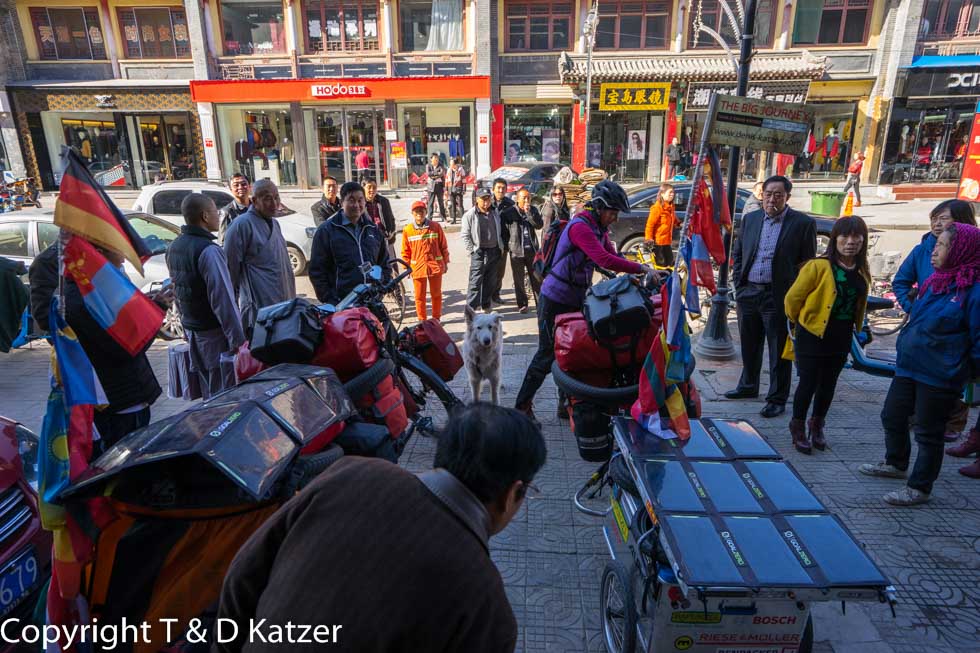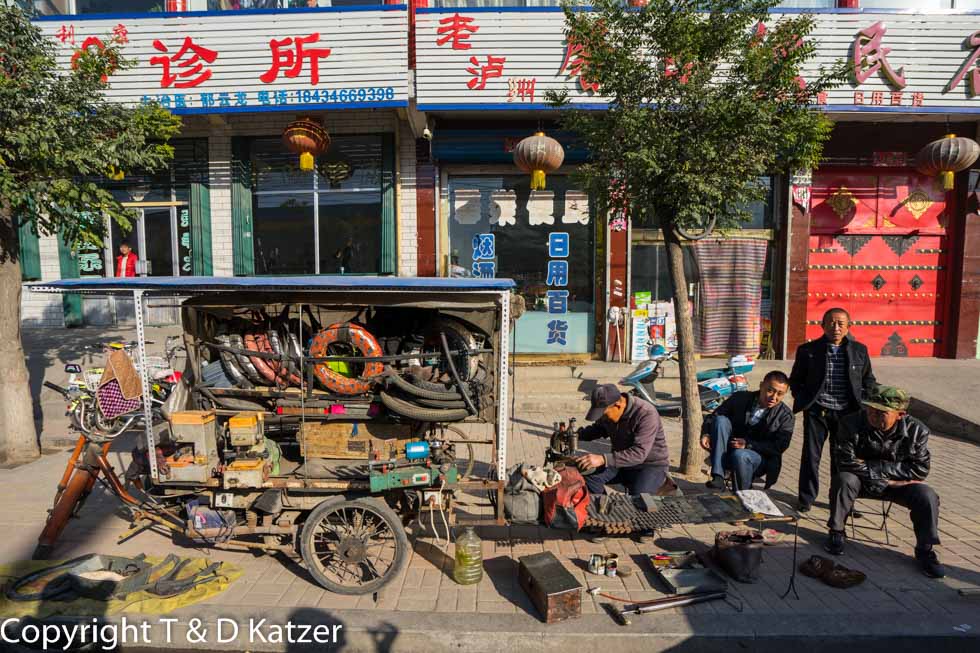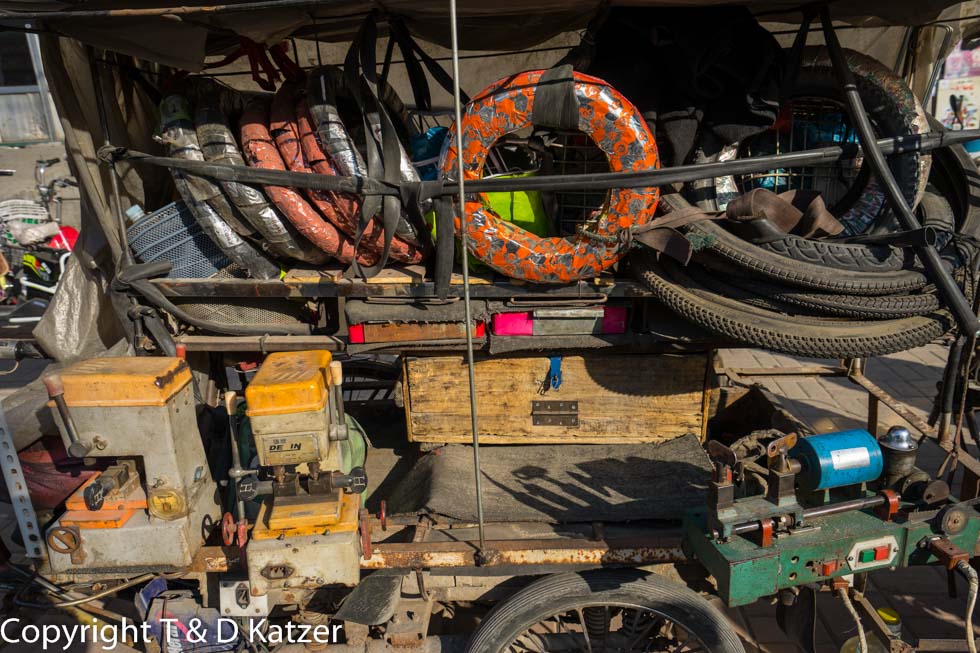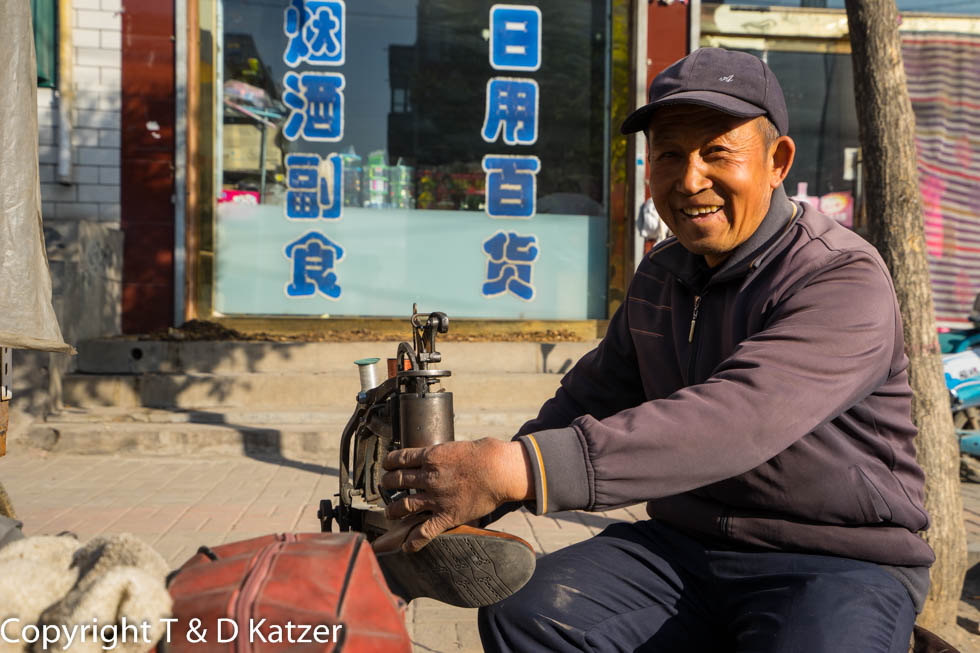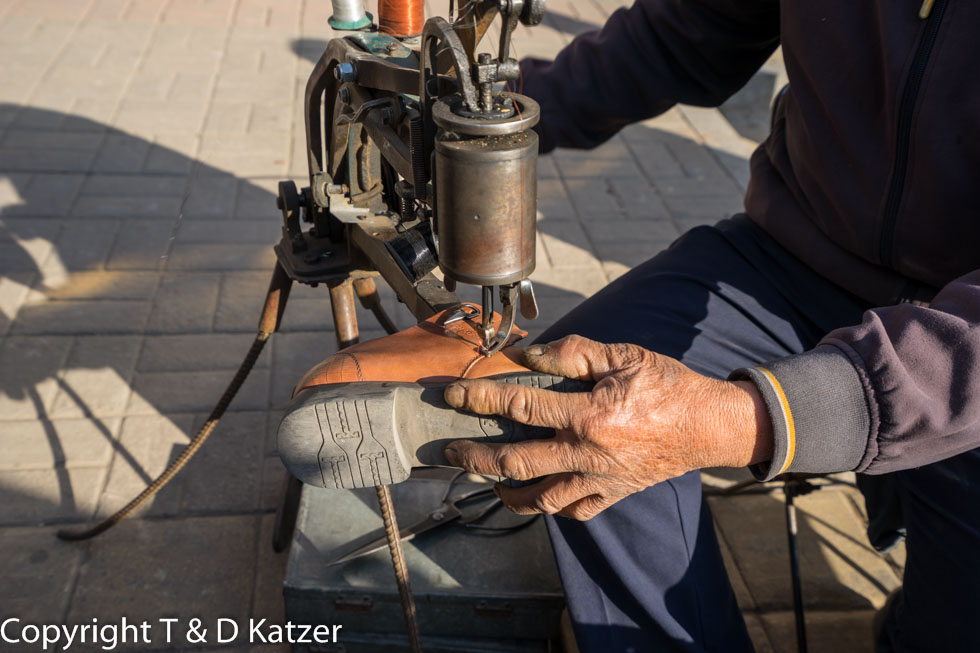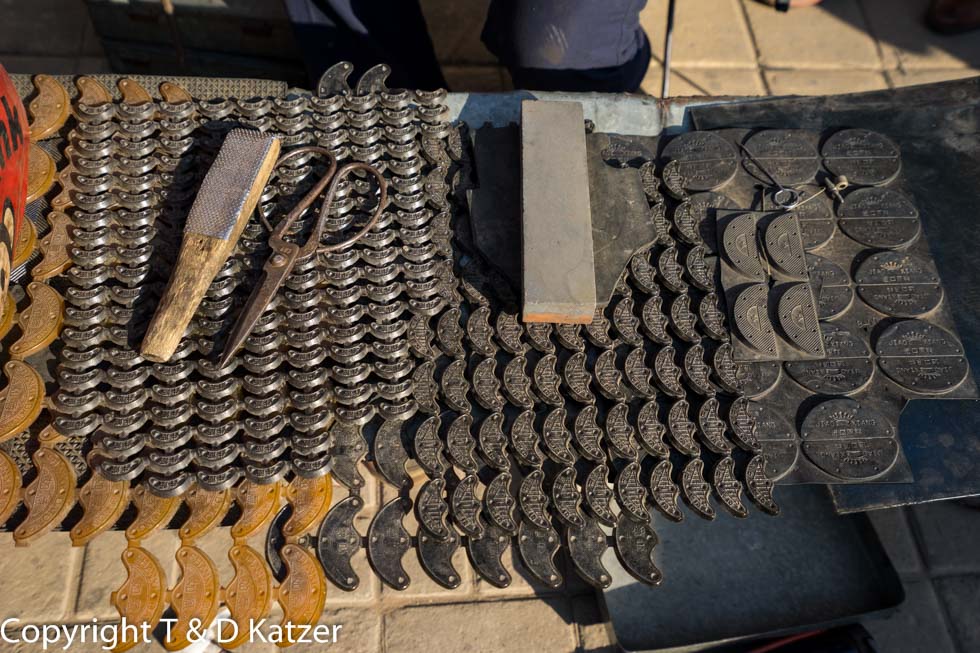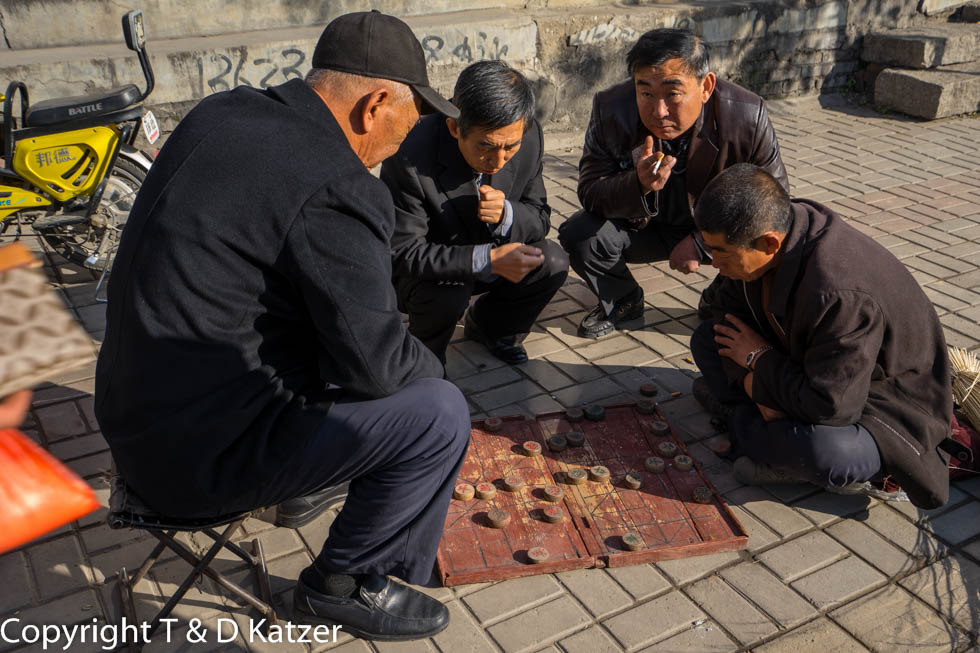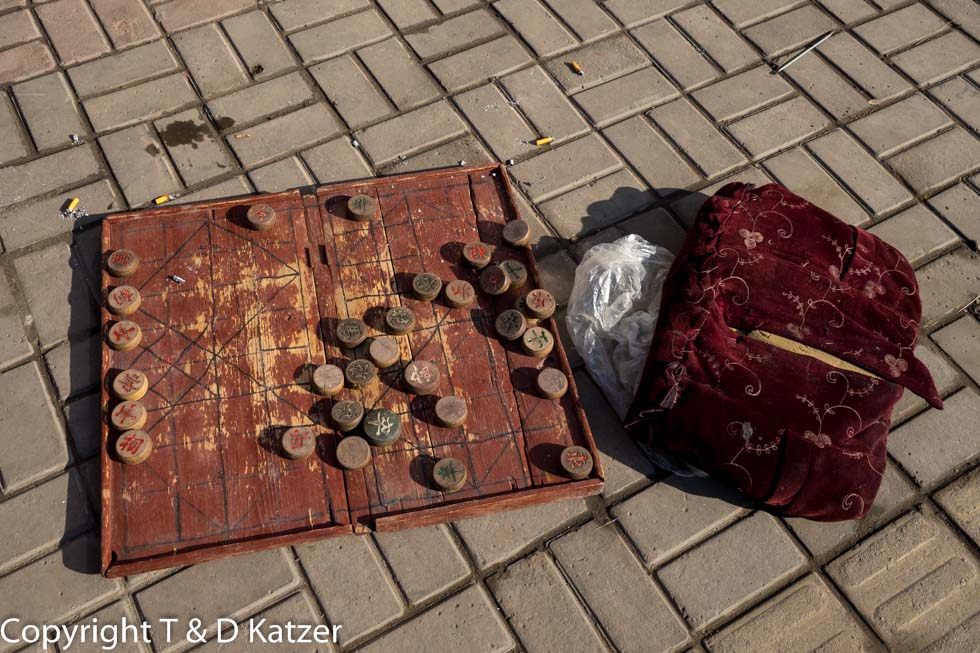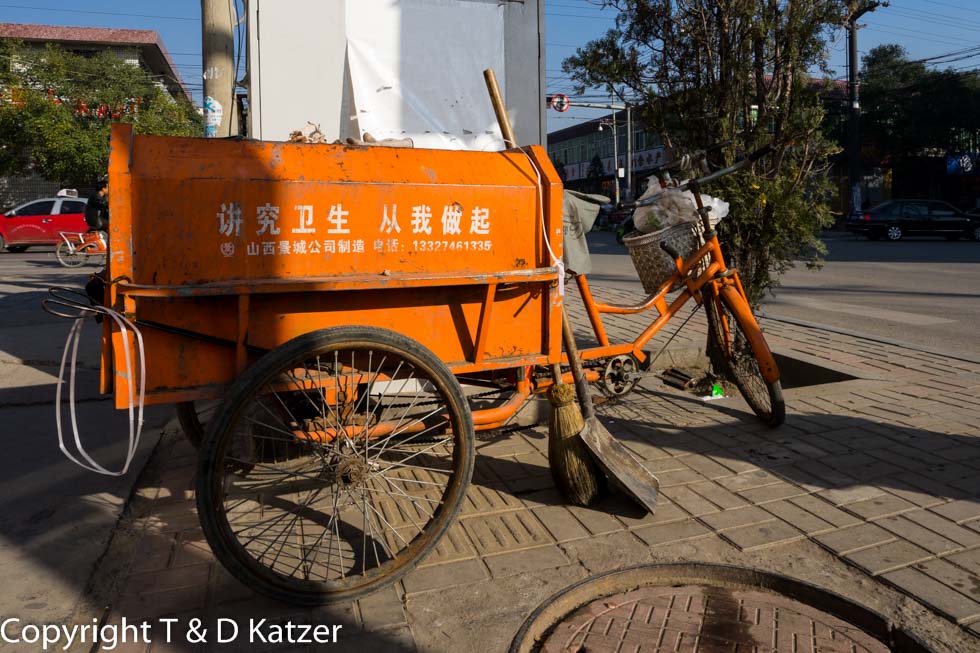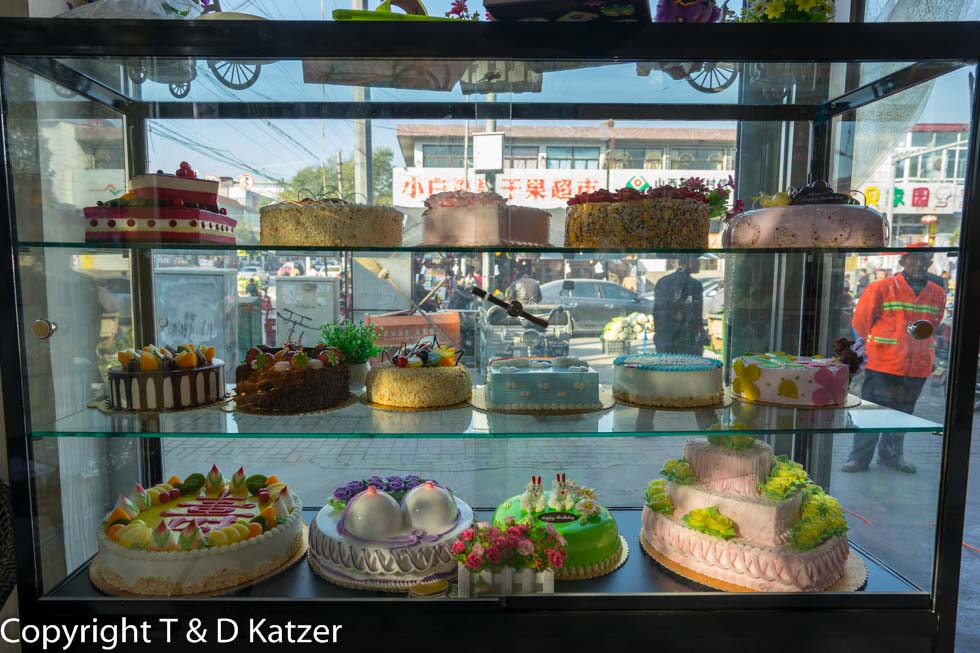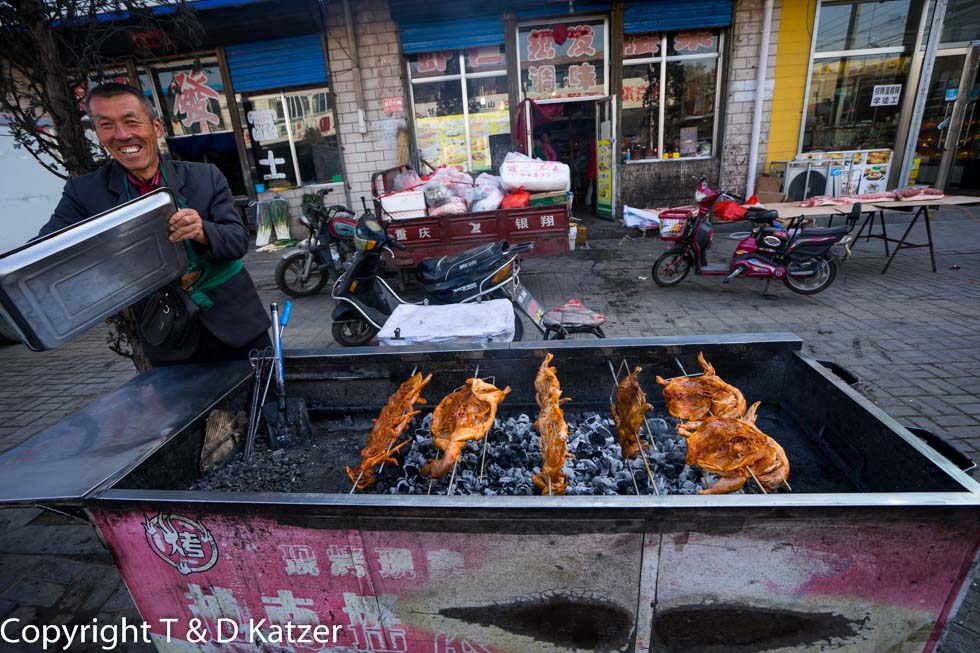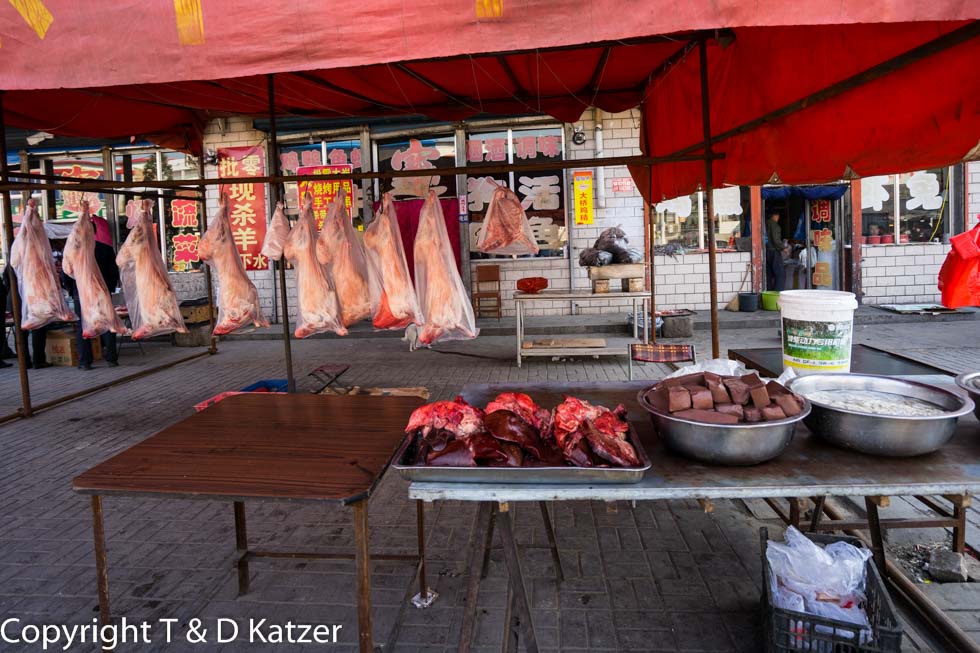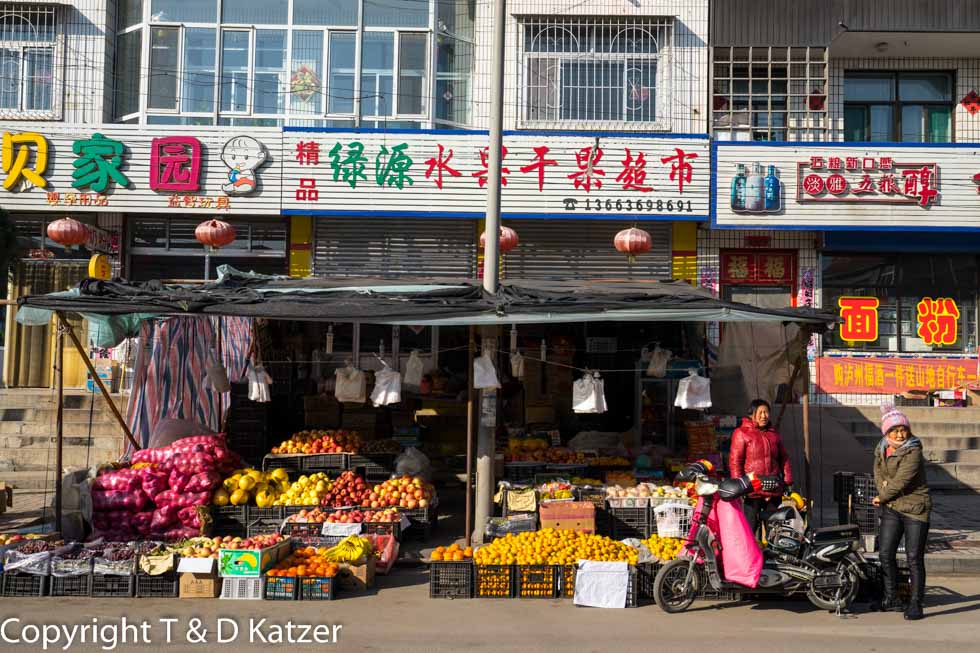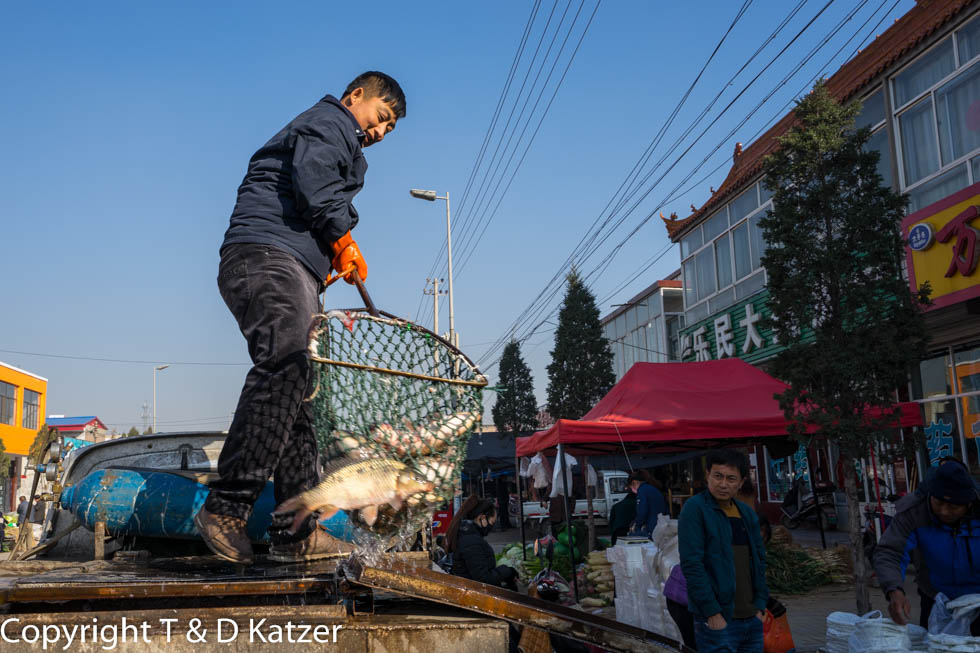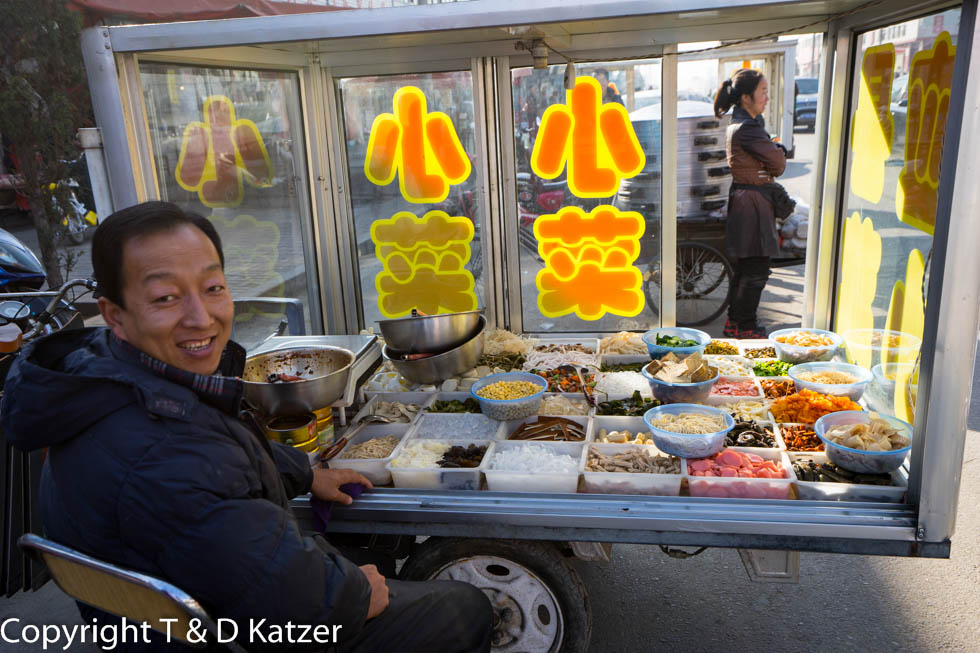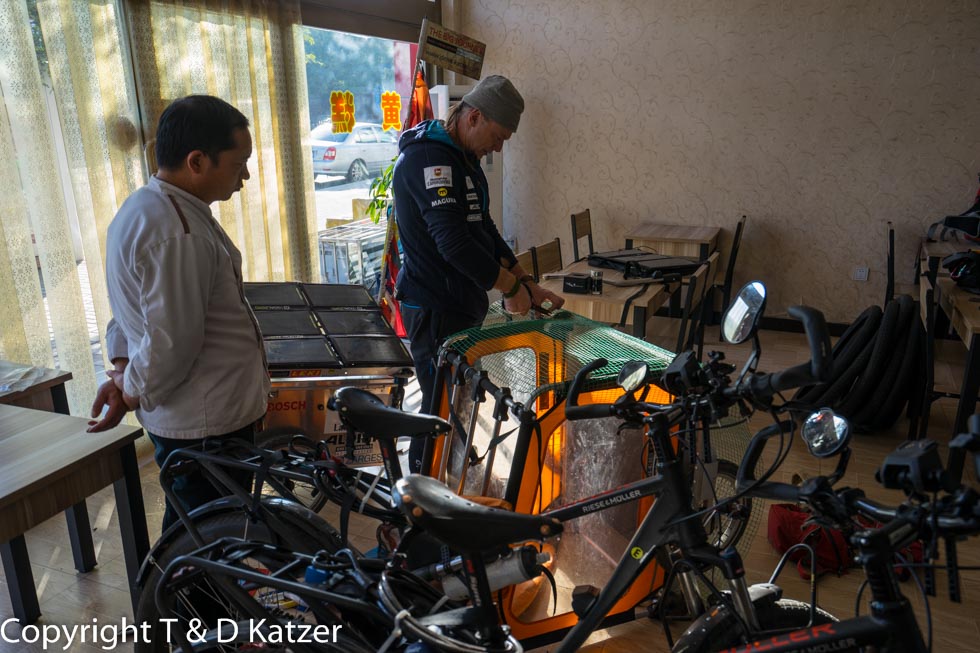
In the world of China’s backyards and alleyways
N 39°31'48.9'' E 112°48'06.4''
Date:
28.10.2015
Day: 122
Country:
China
Province:
Shanxi
Location:
Shanyin
Latitude N:
39°31’48.9”
Longitude E:
112°48’06.4”
Daily kilometers:
48 km
Total kilometers:
10,128 km
As the crow flies:
33.11 km
Average speed:
21.9 km/h
Maximum speed:
27.4 km
Travel time:
2:13 hrs.
Soil condition:
Asphalt
Maximum height:
950 m
Total altitude meters:
6.011 m
Altitude meters for the day:
91 m
Sunrise:
06:50 a.m.
Sunset:
5:34 pm
Temperature day max:
6
Night temperature:
minus 1°C
Departure:
11:00 a.m.
Arrival time:
2:00 p.m.
Total plate tires:
8
Plate front tire:
2
Flat rear tire:
5
Plate trailer tire:
1
(Photos of the diary entry can be found at the end of the text).
As with every departure, people gather around us as if the latest UFO model had just landed. At the beginning, the first passers-by stand at a respectful distance in front of or around us. After a while, they lose their shyness and move closer. After we have loaded and I want to check the route on my smartphone, several pairs of eyes look at the small display. I am so harassed that I really have to assert myself in order to enter my data.
In fantastic weather with no headwind, we speed along on the unlimited hard shoulder. As in previous days, the coal trucks roar past us incessantly, blowing their exhaust fumes and coal dust all over us. We reach the city of Shanyin, which is home to 220,000 people, without any incidents worth mentioning. Lois has also pre-booked a place for us to stay for the next few nights, so we can be sure that we won’t be thrown out again after checking in. The only challenge is actually finding the house without GPS. Again we are sent up and down the road, but as the weather is great and it’s still early afternoon, we don’t let ourselves get stressed. “It could be that building over there,” I say, pointing across the street, and land a hit. The hotel manager and his staff give us a very friendly welcome. Our bikes are allowed into a hotel restaurant that is currently being renovated. As soon as we have unloaded, many hands carry our equipment into a large room where we will write down our experiences over the next few days. We have just sat down on the chairs when there is a knock at the door. “I wonder what they want from us,” I wonder, hoping that I won’t have to experience yet another version of the seemingly endless accommodation stories. I open the door with a queasy feeling. The manager stands there grinning broadly and hands me a heavy package. “Fantastic. The new 500-watt batteries from Bosch have arrived,” I call into the room, taking the box from his hands. As if it were Christmas, we immediately unpack the batteries. “They look just like the 400 watt batteries,” Tanja marvels. “What did you think?” “Well, that they’re bigger.” “Fortunately not. But they have 20 percent more power,” I reply. As each of us now has six batteries, the energy problem will be solved in future. “That means we don’t have to go to restaurants from now on and take an unwanted three-hour break at lunchtime just to get our energy stores full for the rest of the day’s journey. Also, if it wasn’t so cold and uncomfortable, we could pitch our tent at any time,” I say happily. “That’s what I call freedom,” Tanja cheers. “How far do you think we’ll get now?” “You mean the range without having to charge?” I ask her. “Yes.” “Under good conditions, 200 kilometers.” “And if we have to cross mountains and the wind blows against us?” “Maybe half that? But that will become clear in the coming days and weeks.” “Now we just have to find a place to store the extra 15 kilograms,” Tanja ponders. “Yes, above all we urgently need the new drawbar,” I reply thoughtfully. As soon as I’ve finished the sentence, an email comes in from Weber, who sent us the drawbar to China days ago. “Our package was rejected by Bosch. What should we do?” “What? It’s been rejected?” I say, startled. We immediately get in touch with the marketing manager at Bosch in China and find out that the important spare part is subject to domestic customs duty. “We’ll take care of it. Don’t worry about it. When we get the drawbar out of customs, we’ll send it to you with the new GPS. It’s already been on my desk for a few days,” Margaret reassures us. “It’s crazy what you have to take care of on a trip like this to make sure it runs smoothly,” I realize. “Nothing new,” Tanja replies and reminds me of the many months spent organizing our camel expedition in Australia, crossing the Taklamakan desert in western China, spending the winter with the last reindeer nomads in Mongolia, or our elephant trip through Nepal, and, and, and. It’s basically always the same. The administration, organization, constant planning and rescheduling, flexibility, ingenuity and brainstorming, willingness to compromise, tolerance and composure are as much a part of such a trip as day is to night.
In the afternoon, we visit a supermarket to stock up on drinking water. As in all cities, the streets are bustling with activity. We immerse ourselves in the world of alleyways and backyards, the hutongs, where many Chinese people still live today. The smell of the countless variations of Chinese cuisine is everywhere. A shoemaker has parked his three-wheeled cargo bike on the sidewalk and is still repairing a shoe with a small hand-operated machine, just as he did at the beginning of the last century. When I shyly raise my camera to capture him in digital form, he laughs and raises his hand in greeting. Right next to it, four men crouch on their verses and use the sidewalk to play mahjong, a popular game in China and Japan. It was once thought to have been played 4,000 years ago, during the Shang dynasty, and was reserved for the upper classes. In fact, mahjong was probably only created in the second half of the 19th century, and we stand next to it for a while, watching the players and listening to the clattering of the tiles. Then we end up right next to the main road at an open market. A man stands on the tank mounted on his small truck. In his hands he holds a long metal rod with a net attached to the end. He skillfully fishes out ten fat carp with a single stroke, which a restaurant owner immediately takes from him. “Ni hao!” shouts a vendor sitting in front of his self-built motorcycle structure, under whose open glass roof he offers thirty or forty different types of tofu, corn, mushrooms, noodles, eggs and what we can’t define. Just a meter away, a sheep is slaughtered and immediately gutted. Others hang from metal hooks on a pole. Bloody offal awaits buyers in bowls. On the opposite side of the street, colorful fruit and vegetable stalls line the street. In the window of a bakery, cakes shine out at us in every imaginable color. One even has the shape of two full female breasts covered in icing. The traffic coughs and groans past the colors, the orderly confusion, the clamor of the vendors and the loudspeaker announcements of small stalls. The stinking engines of some of the old cargo motorcycles make a noise like heavy fishing boats. A sound that you would rather hear in an Asian harbor. In between, the driver of a heavy, expensive off-road vehicle impatiently presses the horn. Two little boys whizz through the crowd on their tricycle. The front wheel of one is in the cargo basket of the other tricycle. We believe we are moving through a movie full of variations. But the world around us is three-dimensional and real. We are also exotic in the supermarket. We are observed incessantly, unabashedly, curiously. Sometimes people freeze and forget their current activity. The cashier nudges her colleague. “You’re standing with me,” she seems to say proudly, giggling at us and only when she wakes up from her stupor does she collect the purchase.
In the evening we go to the hotel restaurant. Because there is no heating, we might as well sit in a fridge. Here, too, we are stared at incessantly. We feel as if we are the first foreigners to have ever set foot in this city. Dressed in down jackets, we dine in the extremely uncomfortable room. “I can’t wait to see what awaits us tomorrow,” says Tanja. “Me too. According to Spring, the fortress on the Yanmenguan Pass must be a highlight.” “It certainly is. I just hope they let us in and don’t use the late fall to restore the complex…”
The live coverage is supported by the companies Gesat GmbH: www.gesat.com and roda computer GmbH www.roda-computer.com The satellite telephone Explorer 300 from Gesat and the rugged notebook Pegasus RP9 from Roda are the pillars of the transmission.
